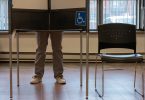By Gwyneth Burns
BU News Service
BOSTON – Young voters are organizing their thoughts and getting more involved in political
conversations ahead of Election Day on Nov. 3.
“The environment, racism, and affordable health care are the top three issues most commonly
named by youth as the most important in driving their vote this November,” according to a 2020
youth poll by CIRCLE, the Center for Information and Research on Civic Learning and
Engagement at Tufts University. “Getting back to normal after the pandemic and police
mistreatment also ranked highly.”
The youngest eligible voters, ages eighteen to twenty-one, are interested and politically active, according to CIRCLE. More than three-quarters of participants in the center’s pre-election youth poll said “they’re paying attention to the election and think it will have an impact on their communities.”
“These are issues that aren’t going away with the election and it’s about choosing people that are
going to take a stand against these issues,” said Boston University student Julia Maruca.
According to a national poll released by the Institute of Politics at Harvard Kennedy School,
63% of 18- to 29-year-old respondents indicated they will “definitely be voting,” compared to
47% before the 2016 presidential election.
Among 18- to 29-year-olds, voter turnout went from 20% in 2014 to 36% in 2018, the largest
percentage point increase for any age group, according to the United States Census Bureau.
“More than 15 million young Americans have turned 18 since the last presidential election. The
Gen Z generation is facing a once-in-a-lifetime experience of a global pandemic, economic
instability, and racial reckoning,” said IOP director Mark Gearan. “Young Americans are seeing
firsthand how their government impacts their day-to-day lives and they are ready to make their
voice heard in this election.”
Young voters are interested in affordable health care. According to Nationscape Insights, 58% of
18- to 29-year-olds are in favor of providing the option to purchase government-run insurance to
all Americans and 57% agree with enacting Medicare-for-All.
Young adults have the most uninsured age group and have the lowest access to employer-based
insurance, according to the Centers for Medicare and Medicaid Services.
“I believe health care should be accessible for everyone,” said Emily Fraser-Read, 22, of Maine.
“No one should have to die or suffer because they can’t afford health care or they don’t have
access to health care providers.”
Climate change and a passion to protect the environment have also driven young voters to the
polls.
According to Nationscape data, 39% of 18- to 29-year-olds are in favor of enacting a Green New
Deal.
“For me personally, climate change and the environment is a big deal because it’s not going
away no matter who wins the election,” said Maruca. “It’s just going to get worse if things aren’t
done about it.”
Maruca voted via absentee ballot thinking that her vote would have more of an impact in her
home state of Pennsylvania, especially this year.
“There is a lot of talk about what will get changed,” Maruca said. “For instance, if Biden wins,
and if you’re looking at it from the perspective of climate change, he is more likely to be the one
who would take actions to mitigate climate change.”
Young Democratic voters are particularly interested in seeing environmental change, with
respondents ranking three related issues in their top five most pressing issue lists, according to an
Alliance for Youth Action poll. The poll showed 91% of respondents support the transition to
100% clean and renewable energy, 86% agree with declaring climate change a national
emergency, and 84% would like to see investments in public transit to reduce carbon emissions.
Race and policing have become a larger part of the conversation following the death of George
Floyd and the resulting Black Lives Matter momentum earlier this year.
On policing, 7% of young voter respondents cited police treatment of communities of color as
the top issue determining their vote this fall, according to CIRCLE data. “Black youth name
racism (22%) and mistreatment by police (15%) as their top issues.” For the comparison, White
youth ranked their top issues as the environment (14.5%) and health care (12%).
“Young Americans today find themselves on the front lines of the ‘triple crises’ of COVID,” said
Justin Tseng, chair of the Harvard Public Opinion Project. “Their education has been disrupted,
job prospects falter, and communities experiencing racial reckonings are causing constant
concern about their daily livelihoods and the well-being of their friends and their families.”
The response to this issue centers around working to eliminate systemic racism to ensure that
people of color do not have to live in fear, said University of Pittsburgh student Sarah
McCafferty, who has attended rallies to protest police brutality.
Young voters are seeking to change this narrative by voting in new leadership this November,
since currently, “with the president’s encouragement, racism is getting worse instead of better,”
said McCafferty.
According to Nationscape data, 19% of young voters are in favor of banning all guns, and 44%
agree with banning assault rifles, compared to the 65+ demographic, where 73% are in favor.
BU student Shiba Esfand attended high school in close proximity to Marjory Stoneman Douglas
High School, the location of the Parkland, Florida shooting. Esfand’s younger sister attends
middle school in the same county where there has been an uptick in drills to prepare students and
faculty in the event of an active assailant on campus.
“While these drills are beneficial, they also cause a great deal of anxiety in my sister and her
friends,” said Esfand. “Children shouldn’t have to go through these drills and fear for their lives
every time they walk into school.”
Young voters are the closest voter demographic to school age, and many experienced these
trainings firsthand and are now seeing the fear heighten as drills become more intense, said
Esfand. Gun violence has never felt closer to home than in recent years.
On the issue of abortion, 20% of 18- to 29-year olds are in favor of never permitting abortion,
according to Nationscape.
“I don’t believe the government has the right to control women’s bodies or what they can access
for medical procedures when they don’t fully understand the risks often associated with things
such as ectopic pregnancies or non-viable pregnancies,” said Fraser-Read. “Making abortions
illegal doesn’t make them disappear, it ends access to safe abortions for those who might die if
they don’t pursue other options.”
These views were demonstrated this past week as women marched in support of equal treatment
and against Amy Coney Barrett’s then-pending confirmation to the Supreme Court in front of the
Massachusetts Statehouse on Oct. 17.
“Young voters are tuning in and facing our nation’s challenges head first,” said Tseng. “Don’t be
surprised when they turn out at the polls in historic numbers.”






[…] Read full story […]